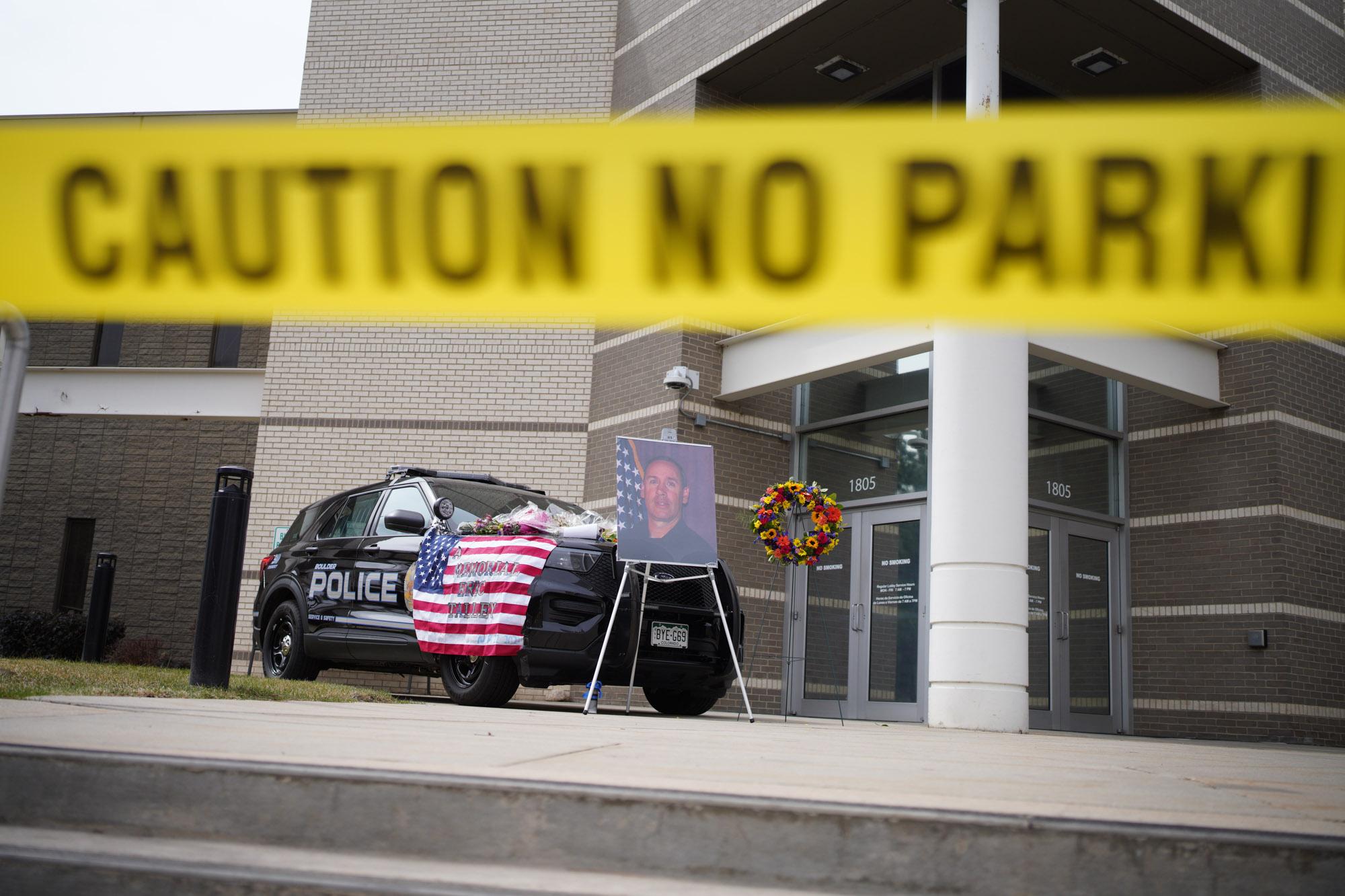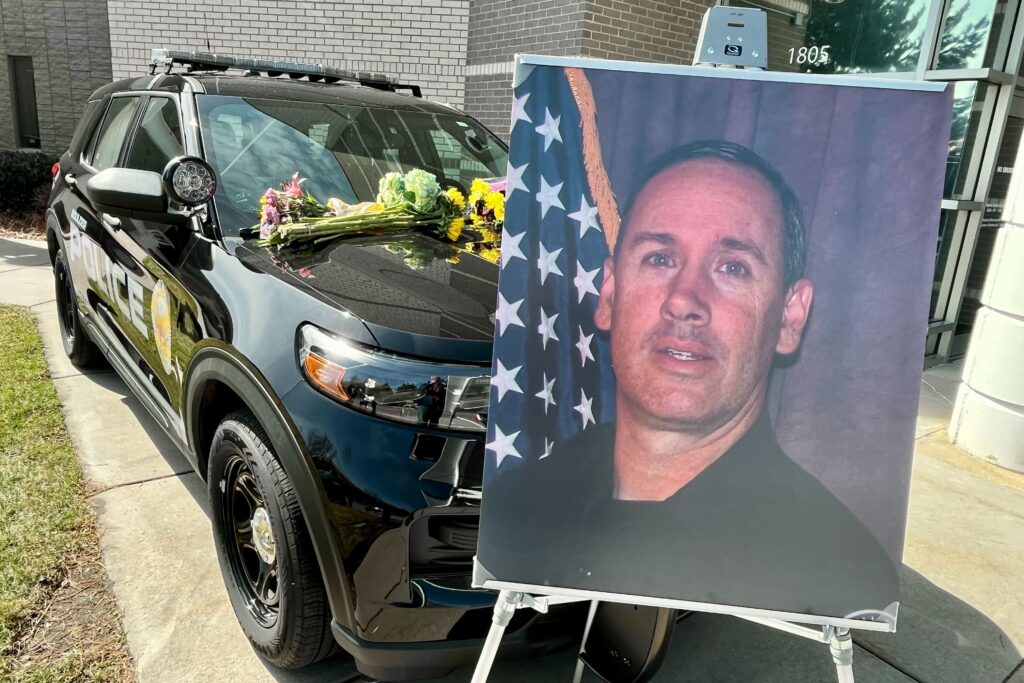
In the year since 10 people were killed in the middle of a weekday at a Boulder grocery store, the Boulder Police Department and the 911 dispatch center have quietly lost dozens of people due to trauma.
When fully staffed, the police agency is supposed to have 190 officers. But at one point last year, the department was down 36 people — with more than half the officers citing the shooting as the reason they wanted to leave.
Officials have tried to hire more people, but they’re still looking for 27 officers. The dispatch center is down 40 percent of its staffers — they now have 14 with a few more in training.
On March, 22, 2021, Boulder Police officer Eric Talley was among the 10 shot and killed at the King Soopers store. Talley, 51 and an 11-year veteran on the force, ran into the store after hearing reports of a gunman firing at people. He was the first officer on the scene.
“This really took a toll,” said Boulder Police Chief Maris Herold. “We have struggled and we’ve tried to put a lot of officer well-being components into the way we go about our lives now … It’s remarkable. They are facing challenges that I haven’t seen in my 30 years in policing … But I’d be lying to you if I said they aren’t tired.”

Herold said she understands that officers are leaving agencies in droves across the country — partly because of the Great Resignation and partly due to the arduous two-year toll of responding to calls amid a deadly pandemic.
But, she said, it feels worse in Boulder.
In addition to the grocery store shooting, the city’s crime rates are increasing, which means fewer officers responding to more serious crimes. Boulder County’s violent crime rate jumped 27 percent between 2019 and 2021, according to the Colorado Bureau of Investigation.
As a way to take care of her force, Herold opened the agency’s doors to people who wanted to help. They brought in therapy animals, including ponies, and offered acupuncture, massage and yoga, along with therapists for the officers.
Herold has stressed to her staff that they need to take care of each other, especially after the trauma of the shooting.
As the tight-knit community reflects on the year after a tragedy, law enforcement officials continue to push for justice.
Boulder District Attorney Michael Dougherty said he hopes the accused mass shooter, who reportedly engaged in a firefight with several officers before surrendering, will have his day in court.
Last year, 22-year-old Ahmad Al Aliwi Alissa was found mentally incompetent to stand trial, which means he couldn’t assist in his own defense or understand his pending criminal charges.
He has been hospitalized at the Colorado Mental Health Institute at Pueblo for the past 90 days and going through competency restoration. When four different doctors found Alissa mentally incompetent last year, there was agreement he was likely going to be able to be mentally restored if he was medicated.
His doctors in Pueblo are under a court order to provide 30-day reports to prosecutors and public defenders about how he’s doing.
In a ruling issued March 11, Boulder Chief Judge Ingrid Bakke said that there was a “substantial probability” that Alissa, who faces more than 100 criminal charges, will improve with the use of medications and eventually be able to start his court proceedings.
“We want to do everything we can to push ahead with this case — especially for the victims and the families, so seeing the doctors believe he’ll be restored to competency in the foreseeable future was certainly a positive development for the prosecution but especially so for the victims and their families,” Dougherty said. “They’re making progress with the defendant and there is a substantial probability that he’ll be restored to competency in the reasonable future.”
In the vast majority of incompetence cases in the criminal justice system, defendants are eventually restored through counseling and medication.
At the time of his various evaluations, Alissa had been sitting in county jails for months. Defendants usually deteriorate in jail settings, which means Alissa may have been in worse shape after his time in jail than he was the day of the shooting.
The average stay for competency restoration is 120 to 150 days, according to the Colorado Department of Human Services.
The Pueblo hospital is so short-staffed there are fully three units — or almost 100 beds — shuttered.
More than 350 people, the vast majority facing lesser charges than the accused Boulder shooter, are sitting in county jails across the state while waiting for mental health competency restoration before they can face pending criminal charges.
Colorado officials are under a federal consent decree to move people through competency restoration in a timely way but have fallen behind — particularly during the pandemic because there just aren’t enough hospital beds to treat the hundreds of people.
State officials late last year started asking prosecutors to drop criminal charges so people can leave jail. Roughly 24 percent of people awaiting competency restoration face misdemeanor charges.
Officials also started trying to stabilize people in jail — before they get to in-patient treatment — to try to pare down the time they need to stay in a hospital bed.
“We are aware this is not the best setting for these individuals,” said Jagruti Shah, interim director of the Office of Behavioral Health at the Colorado Department of Human Services. “We’re doing whatever we can to address the length of stay. As we can serve someone and restore them in a quicker amount of time, that means we can serve more people with the existing resources we have.”
Alissa is next due in court April 15.
As the community gets ready for a week of remembrances, Boulder Chief Herold said she personally gained some closure by visiting the new Boulder Strong art museum, which has painted portraits of people directly affected by the shooting.
She’s grateful to live in such a supportive community that has stopped at nothing to help people — including police officers — in the wake of such a tragedy.
“It helped me put another closure loop on it,” Herold said. “We’re going to get through this. We’re a resilient police department … and community.”









